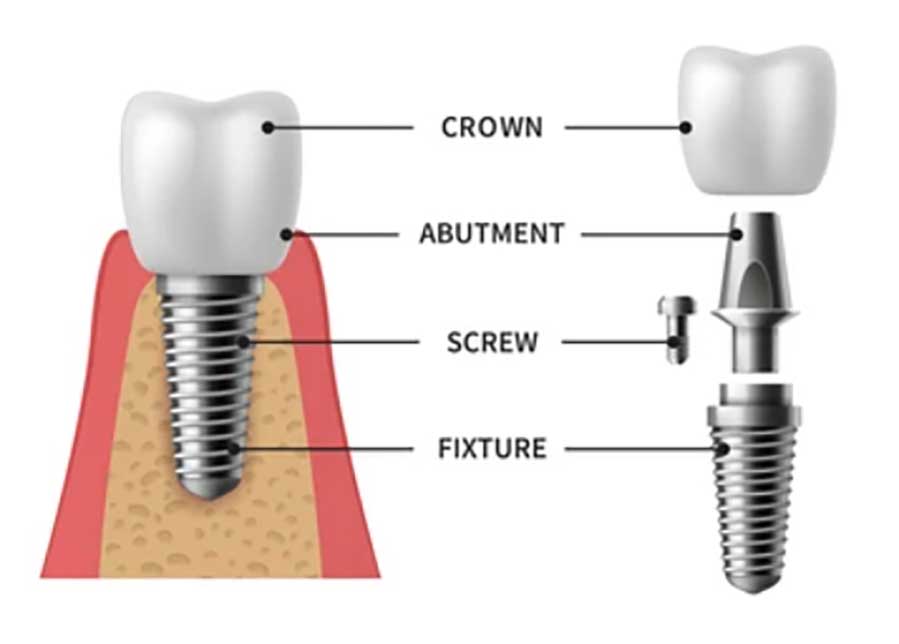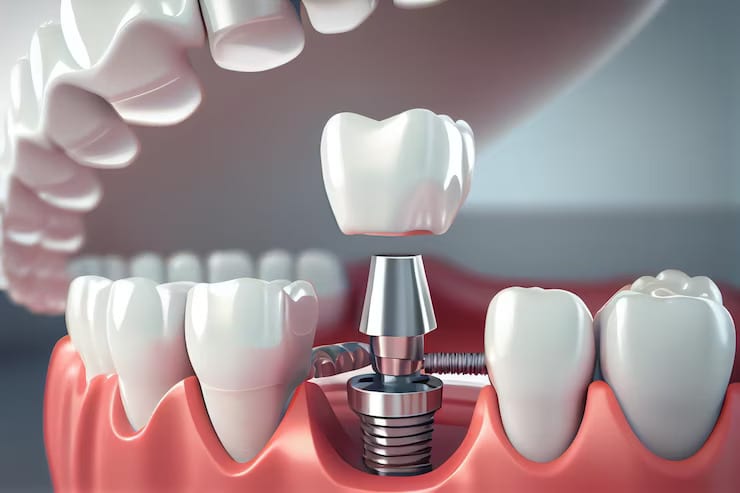Dentists Galena OH Full Mouth Dental Implants: An In-Depth Overview
Mono Implants Columbus OH What Are Dental Implants? Types, Benefits, and More
Dental implants have emerged as a well-liked alternative for individuals in search of a long-term answer to tooth loss. One important facet of understanding dental implants entails their impact on adjacent teeth. This is particularly necessary for guaranteeing the health and longevity of the entire dental structure.
When a dental implant is positioned, it mimics the function of a natural tooth root. By doing so, it helps preserve the integrity of the encircling bone structure. Natural teeth depend on a balanced, interconnected system for help, and dental implants can contribute positively to that dynamic. The stability provided by the implant permits for better distribution of bite forces, which can prevent undue stress on adjacent teeth.
Johnstown Dental Centerburg OH The Best Dental Implant Services
In cases the place a tooth is missing, the neighboring teeth might shift into the vacant house. This shifting can lead to misalignment and various other issues. By placing a dental implant, the danger of this shifting is lowered, because the implant acts as a placeholder that preserves the natural alignment of surrounding teeth. This preventive impact is crucial for long-term oral health and function.
Another essential consideration is bone loss. When a tooth is misplaced, the jawbone within the space can begin to deteriorate as a end result of an absence of stimulation. Dental implants assist prevent this bone loss by providing the necessary stimulation to the jawbone, very comparable to a natural tooth root would. This preservation of bone not solely helps the implant itself but also contributes to the steadiness of adjacent teeth.
The sort of fabric used in dental implants, typically titanium, has a unique property of osseointegration, meaning it fuses with the bone over time. This integration provides a sturdy foundation for the artificial tooth while ensuring that the implant doesn’t negatively affect surrounding structures. As the implant integrates, it creates an surroundings that contributes positively to the health of the adjacent teeth.

Regular dental check-ups play a vital function in monitoring the impression of dental implants on adjacent teeth. Professional assessments may help identify any issues that may arise, making certain immediate therapy and sustaining the health of the whole dental arch. These evaluations might embrace X-rays to check for bone density and the general condition of the implant and surrounding teeth.
Family Dental Clinic Hartford OH Are Dental Implants Permanent? What You Should Know
Oral hygiene practices are vital for individuals with dental implants. Proper brushing and flossing habits not solely contribute to the longevity of the implant but additionally make certain that adjacent teeth stay wholesome. Food particles and plaque that accumulate around the implant can cause problems, including peri-implantitis, an inflammatory condition that can have an result on surrounding teeth and tissues.
The positioning of dental implants can affect the health of adjacent teeth. If an implant is placed at an angle or not properly aligned, it may lead to increased pressure on neighboring teeth. This misalignment may trigger wear and tear on adjacent enamel, potentially resulting in cavities or other dental issues. Therefore, the ability and experience of the dentist performing the implant process are paramount in achieving a profitable end result.
In some situations, extra procedures may be needed to organize the surrounding space for an implant. Bone grafting or sinus lifts may help create a better environment for the implant. While these procedures are geared toward enhancing the location for the implant, additionally they serve to protect the health of adjacent teeth by making a more steady basis.
Dental Care Associate Pataskala OH Full Mouth Dental Implants

As dental technology evolves, advancements in implant strategies lead to higher outcomes. Improved imaging methods and computer-aided design permit for extra exact placements that minimize risk to adjacent teeth. With these advancements, the chance of issues that could arise from improperly placed implants diminishes considerably.
Post-operative care also performs a critical function in guaranteeing that adjacent teeth remain unaffected. Patients should adhere to the dentist's directions regarding food plan, oral hygiene, and follow-up visits. Neglecting these tips might lead to complications that impression not solely the implant but in addition the neighboring teeth.
Dental Care Condit OH Single-Tooth Implants: Everything You Need to Know
In conclusion, dental implants, when positioned accurately and cared for properly, have the potential to enhance the health of adjacent teeth quite than detract from it. They maintain alignment, stimulate bone development, and supply a secure foundation that supports the entire dental structure. Understanding how dental implants affect adjacent teeth emphasizes their significance as a long-term tooth replacement solution. With continuous advancements in technology and techniques, the mixing of dental implants into restorative dentistry is becoming increasingly successful, making certain healthy and functional smiles for years to come back.

- Dental implants prevent adjacent teeth from shifting into the hole created by a missing tooth, helping to maintain proper alignment within the mouth.
- The rebuilding of the jawbone through an implant can stimulate surrounding teeth and maintain them wholesome by providing necessary bone density that might in any other case diminish.
- Adjacent teeth profit from the stabilization that dental implants present, lowering the chance of wear and tear from misalignment during chewing.
- Implants can shield adjacent teeth by acting as a framework, which might distribute bite forces evenly throughout the dental arch instead of inserting undue stress on neighboring teeth.
- When positioned accurately, dental implants minimize the danger of gum disease which might have an effect on adjacent teeth by maintaining a clean and wholesome gum line.
- The presence of an implant can facilitate an improved oral hygiene routine, because it eliminates the necessity for bridgework that might lure food particles around adjacent teeth.
- Regular dental check-ups can reveal how properly the implant integrates with surrounding buildings, guaranteeing ongoing health for adjacent teeth.
- Implants can prevent the natural strategy of bone resorption that occurs after tooth loss, positively impacting the stability and longevity of adjacent teeth.
- The use of dental implants would possibly scale back the necessity for extra invasive procedures in the future, offering a long-term resolution that maintains the structure of the entire dental arch.
- Successful integration of an implant into the dental arch enhances total oral function, typically leading to improved confidence and oral health for adjacent teeth.undefinedHow do dental implants affect adjacent teeth?
What impression do dental implants have on the alignment of adjacent teeth?
Dental implants typically prevent the shifting of adjacent teeth, serving to to maintain correct alignment. This stability can cut back the chance of creating bite issues over time.
Can dental implants trigger injury to nearby teeth?
When positioned appropriately by a professional professional, dental implants shouldn't injury adjacent teeth - Orthodontics Johnstown OH. However, improper placement or inadequate planning may lead to complications
Premier Dental Galena OH The Benefits of Dental Implants: Why Choose Them?
Do dental implants require any particular care relating to adjacent teeth?
Maintaining good oral hygiene is crucial. Surrounding teeth should be brushed and flossed frequently, and routine dental check-ups will assist be positive that each the implants and adjacent teeth remain wholesome.

Will dental implants impact the my blog health of my surrounding teeth?
Dental implants can enhance the health of surrounding teeth by distributing chew forces evenly, lowering put on and tear. Additionally, they will prevent bone loss within the jaw, which might affect adjacent teeth.
Smile Care Hartford OH Full Mouth Dental Implants: An In-Depth Overview
Are there any long-term results of dental implants on close by teeth?
Long-term, dental implants may help protect the health of adjacent teeth by preventing shifting and potential gum issues, ultimately contributing to better oral health general. - Orthodontics New Albany OH
Can gum problems arise round adjacent teeth after getting implants?
If correct dental care is neglected, gum points may develop around each the implants and adjacent teeth. Following post-operative care directions is important to minimize these risks.
Dental Care Associate Sunbury OH The Advantages, Risks, and Insurance for Dental Implants
How do dental implants examine to bridges by check method of adjacent teeth?
Dental implants are sometimes beneficial as they don’t require alteration of adjacent teeth, unlike bridges, which necessitate reshaping of nearby teeth for support. (Mono Dental Implants Condit OH)
Can I still get cavities in adjacent teeth if I official source even have dental implants?
Yes, adjacent teeth can still develop cavities if not correctly cared for. Dental implants themselves cannot get cavities, however they require vigilant hygiene practices to protect surrounding natural teeth.
What is the success rate of dental implants in relation to surrounding teeth?
The success rate of dental implants is high, nevertheless it largely is decided by the quality of the process and ongoing care. Well-maintained implants usually lead to higher outcomes for adjacent teeth as well.